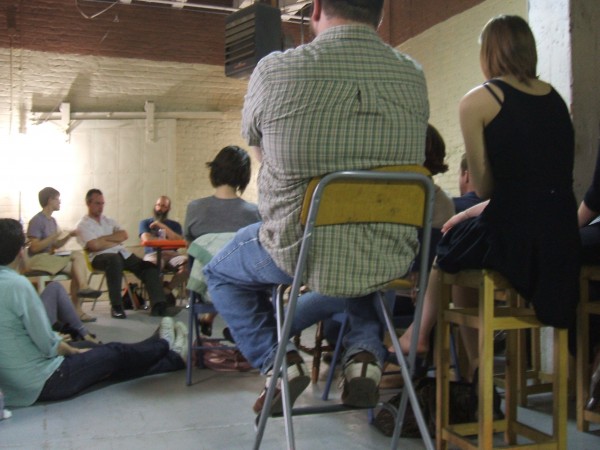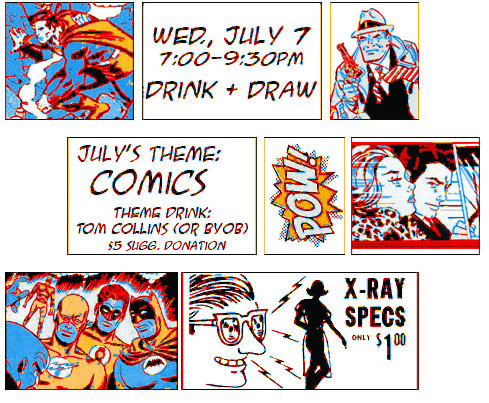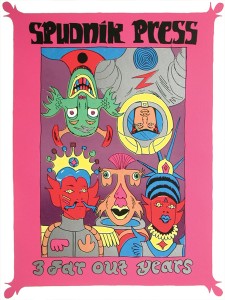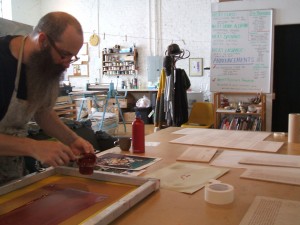Last week, we hosted The Local Residency, a panel discussion organized through Studio Chicago. Studio Chicago asked me to be a guest blogger, and below I have re-posted an article that I wrote that gives a little insight into the creation of Spudnik Press.

Building (and Revising) A Community Studio
A short review of the creation of Spudnik Press Cooperative
In establishing Spudnik Press, I aimed to create a community that allows artists all the benefits of working among peers without the compromising their own studio practice. Another main concern was to create a space that was sustainable. I had seen too many interesting projects deteriorate because of unstable economics or administrative support.
I aim to share a few stages of Spudnik’s development that led me to the current “business model” we are using. Instead of focusing on particular problems that could arise, I will address thematically my approach to developing Spudnik Press Cooperative. I have outlined the core principals that guide the choices made at the studio. Returning to these fundamental goals of the studio has helped me through tough decisions regarding how the space should be funded, how exactly we should provided accessibility, and how to allocate use of the studio.
Building the Foundation
Planning a new project is one of my favorite things to do. Envisioning what something can be and creating a plan to achieve those visions is rewarding and fun. However, I found the period immediately following this, to be the most daunting and lonely…
In the initial stages of any project, there is a lack of evidence that the project will be successful. This causes skepticism. I continually asked for favors and quickly became indebt to most people I was close with.
Growing the Studio
Once Spudnik was officially open, it gained momentum very gradually. Although our early Open Studio sessions were often quiet, I was able to effectively use this time to research the next stage of the press. We gradually added materials and tools as well as classes, portfolio exchanges, additional hours, memberships, and a residency program. Increased programming was matched with increased volunteering and income. Gradually there was a welcoming shift from me asking for help to help being offered to Spudnik.
Reflection and compression
At this point, I decided it was time to move Spudnik Press out of my apartment. Spudnik went through a period in which printers did not feel ownership over the studio. Printers felt that the space was my own, and that they could not (and should not!) partake in decision-making. The press had recently moved from my apartment space to a dedicated commercial space. Printers overly respected that I had built the studio from the ground up, and didn’t want to infringe upon my goals and aspirations. As respectful as this was, it was also problematic because I wasn’t entering the role of Director with prior experience. I needed help determining our direction. Additionally, we started to outgrow the systems that I had created when we were a fledgling print shop. I was eager to keep growing and expanding, but need to pause and readdress what roles Spudnik could and should serve in a more thorough way than was possible when I was in the planning stage.
Some of the projects I spent time on were pragmatic like website development and streamlined accounting through improved excel formulas. I also extensively researched how other studios provide access and establish fees for use of the space. I created surveys and held meetings. Eventually, I was able to come to some conclusions about how Spudnik should move forward. I increased transparency and was very open about Spudnik’s need for a participatory community. I streamlined more of the day-to-day administration of the shop and made a distinct plan for the next year, allowing me to enter a second period of growth.
Growing the Capacity of the Space
Many of the earlier difficulties have been replaced with new ones. For example, we no longer have to plead for volunteers. Instead, we are struggling to find the best ways to effectively utilize multiple volunteers. We are working to maintain balance among the various uses of the space, and working on long-term goals like applying for tax-exemption and seeking outside funding. Instead of expanding the programs offered, we are working to maximize the capacity and the impact of the programs.
I currently don’t have the luxury of being able to step aside to reflect and compress, but need to do these things while growing and expanding. I also am reaching a point where the things I need to learn to stay a step ahead of the game are larger and more daunting topics. Without a background in law, accounting, real estate, art administration, or experience as a press technician or manager, I am reaching out to a larger network of people. I am utilizing other organizations like Lawyers for the Creative Arts, other print shops like Anchor Graphics, individuals serving on our board of directors, and members of Spudnik Press.
POSSIBLE MODELS FOR SUSTAINABLE SPACE
While researching ways to structure our studio, I looked to many other established print shops. I borrowed heavily from some of the philosophies and structures of the following places: AS220 Printshop, Chicago Printmaker’s Collaborative, Flight 64, Lill Street, The Post Family, and All Along Press.
In the end, I settled upon the following principals to guide decisions regarding use of the studio:
Allowing Self-Determination: Through maintaining independence from any institution and not depending on restricted funding, such as grants, we are able to determine our own priorities and allot funding appropriately. We aim to support the studio through earned income. We will seek grants to improve and expand what we are able to provide the community, but not rely on grants to make ends meet.
Creating a Culture of Learning: When conceptualizing new classes, determining pricing structures, and developing new programming, we focus on creating multiple avenues for members to grow their artistic practice. Offering classes creates the opportunity for people to learn. However, if we intentionally foster particular types of interactions, learning (and teaching) becomes practically unavoidable for those using the studio.
Supporting Varied Studio Practices: By providing multiple ways an artist can use a space, we can enhance their artistic production and output instead of hinder it. Allowing the artist to determine how they wish to function in the space allows printmaking to be fluidly integrated into their studio practices. Artists are welcomed in whenever a print project presents itself.
Support the Artist beyond the Project: By working with artists beyond the print process alone, we are able to help them realize their artistic goals. For example, by providing artwork documentation and representation at shows and sales such as NEXT and Renegade, we are able to help artists have the tools they need to increase their exposure, apply for grants and residencies, and supplement their income through their art.
Maintaining Relevancy to our Community: The studio is a place for diverse people to interact, engage with each other, and be affected by each other. The studio is also a place where content is made to take out to the community and create the visual culture of a city. By working with artists from multiple disciplines, varying age groups, diverse backgrounds, we are able to bridge communities. By partnering with organizations that work in fields beyond our own such as Homeroom Chicago and Marwen we preserve relevancy beyond exclusively printmakers and printed matter.
Incorporating Evolution into our Structure: Recognizing that the particular people and projects that support our community will change over time allows for the studio to progress. We often reprioritize based on what resources we have on hand and what skill sets our volunteers and interns are bringing to the studio. We are constantly revisiting and altering studio availability as we become more or less reliant on particular sources of income. We have diversified our sources of income such that one area can decline without the studio loosing our stability. Our flexibility allows us to find alternative means to supplement our income, such as private lessons and consignment printing.











